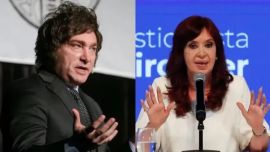Argentina’s government sold dollars in the foreign-exchange market Monday for a fifth straight session as it tries to stem a slide in the peso, according to two people with direct knowledge of the matter.
The Central Bank carried out the sales, likely acting as the Treasury’s financial agent in the local currency market. It sold between US$450 million and US$480 million at around 1,430 pesos per dollar, the people said, asking not to be identified discussing confidential operations. The peso weakened 0.4 percent to close at that level.
President Javier Milei’s administration has sold an estimated US$1.3 billion since last Tuesday, depleting the Treasury’s already thin cash position. The government had US$1.8 billion in dollar deposits as of October 1, according to the latest official data. Under the terms of its International Monetary Fund accord, Argentina’s Central Bank can’t use its reserves unless the peso breaches a floating band that ranged from 943 to 1,484 per dollar on Monday.
The sales underscore the pressure on the peso, even after the United States pledged assistance and local authorities reintroduced capital controls in recent weeks, including a 90-day ban on reselling dollars. Argentine Economy Minister Luis Caputo and Central Bank President Santiago Bausili traveled to Washington on Friday for talks with US Treasury Secretary Scott Bessent and the IMF.
The government had sold $1.1 billion to stabilize the peso before Bessent promised the financial lifeline last month.
A central bank spokesperson declined to comment Monday, while the economy ministry didn’t immediately respond to a request.
President Javier Milei brushed off questions about the cost of defending the peso amid growing skepticism over the sustainability of his foreign-exchange strategy during a interview with LN+ television on Sunday night. He added that the results of the talks with the US would soon become clear.
“Do you know how much we had in gross reserves when we took office?” he asked, saying reserves had risen to $43 billion from $21 billion since then. “That’s it. The discussion is over.”
by Ignacio Olivera Doll, Bloomberg



















Comments